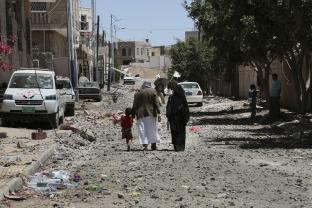
Modern armed conflicts are increasingly fought in urban environments, with millions of people bearing the brunt of their tragic consequences. This trend has a catastrophic impact on the civilian population and poses serious legal and operational challenges that need to be addressed to ensure that people living in such environments are protected and their needs cared for.
This highlight presents eight new case studies, which illustrate the ways wars are fought in cities and the challenges such trends raise in recent and contemporary contexts. These cases allow lecturers, students and professionals to dig into three challenges related to urban warfare, namely the conduct of hostilities, reverberating effects on vital services and the threat to cultural heritage.
Conduct of hostilities
- The armed conflict in Syria explores the way hostilities were conducted during the first years of the conflict, in particular the resort to air strikes on urban areas and the siege of the city of Yarmouk.
- Israel/Palestine, Operation Protective Edge analyses hostilities that took place in 2014 in Gaza, one of the most densely populated areas on earth.
- The 2016 ICTY judgement Prosecutor v. Radovan Karadzic examines the legality of various shelling and sniping incidents during the siege of the city of Sarajevo, between 1992 and 1995.
- Libya, Report of the Office of the UN High Commissioner for Human Rights explores attacks on densely populated residential areas in several Libyan cities throughout 2014 and 2015.
- Finally, the ICRC 2015 Report on International Humanitarian Law and the challenges of contemporary armed conflicts contains a section on The use of explosive weapons in populated areas, which presents the ICRC’s position on the matter.
Reverberating effects on vital services
- Yemen, Naval Blockade shows how cities can be particularly affected by the (in)direct effects of conflicts. Disruptions of the food, water and medical supply chains have impact on large population and on hospitals, which are often located in cities, as it is the case in Yemen.
Threat to cultural heritage
- Cultural heritage is also increasingly threatened in cities, as was the case in Mali, Accountability for the Destruction of Cultural Heritage, which concerns the destruction of mausoleums in Timbuktu in 2012, ICC's first trial on destruction of cultural property.
- Syria, Destruction of Cultural Heritage shows that in cities particularly, heritage sites are being used for military purposes or have been transformed into battlefields, including the Aleppo Citadel, the Damascus Citadel and the National Museum.
Additionally, the ICRC’s 2017 Conference Cycle on War in Cities features a series of high-level public events and expert meetings in Geneva, abroad and online. The first two conferences of this cycle can be watched online:
- War in cities: Addressing the humanitarian challenges: An international panel of experts gathered in Geneva discuss ways in which national authorities and key humanitarian actors can encourage and reinforce the respect for IHL in urban armed conflicts.
- War in cities - what is at stake?: This lecture by ICRC President Peter Maurer focused on the specific legal and operational challenges of urban warfare, particularly on the steps that must be taken to better protect the civilian population.
To go further…
- The latest issue of the International Review of the Red Cross on "War in cities" is available online. In particular, the article on Proportionality and precautions in attack: The reverberating effects of using explosive weapons in populated areas presents a detailed analysis of IHL rules applying in urban contexts.
- Advanced IHL Learning Series on the use of explosive weapons in populated areas: Addressed to lecturers and trainers who wish to update their knowledge of the latest developments and challenges in IHL.
- Explosive weapons in populated areas: The consequences for civilians: An ICRC video that highlights the indirect effects of the use of these weapons in urban areas.
- ICRC’s 2015 Report on Urban services during protracted armed conflict, based on 30 years of ICRC work in urban conflict zones including Iraq, Gaza, Ukraine, Syria and Yemen.
- Syria Street: a storytelling project by ICRC Lebanon.
